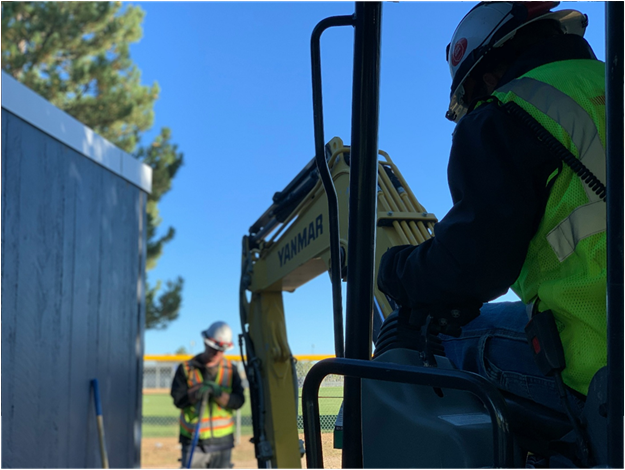When you picture your future house, you are likely envisioningthe end result – a stunning living room, spacious kitchen, or welcoming backyard. However, before any of that can take place, there is a key step in the construction process where you will have a stable foundation and will prevent setbacks in the future: excavation.
Excavation makes sure there is a stable base, as well as drainage that correctly accommodates your home to work with later stages in the construction process. For those planning to build new construction in Philadelphia, a good understanding of the excavation process will allow you to make educated decisions earlier on and also prevent projects from being delayed. Although this step commonly occurs at the beginning of construction, excavation affects all subsequent stages to follow. This is the key step in terms of getting it right the first time at the beginning, which will reward you for many years afterwards.
Preparing a Site for Foundation Work
Excavation begins with preparing the site for foundation work. In this phase, clearance of old structures, trees, or brush that obstruct the site must take place. You may also have to use residential and commercial demolition services to dispose of complete buildings or concrete slabs. You may also have to think about whether junk removal was in the previous resident’s original lease agreement for any leftover building materials.
Upon clearing the site, the excavation team begins digging down to the proper depth for foundation work. The depth of the excavation will depend on the design of your home, soil composition, and local building codes. This phase is so critical because once a site is excavated correctly, you can be assured that the foundation has a sufficient and stable base and will minimize any chance of settling or cracking in the future. Check this link to learn more about safety procedure of excavation.
Grading and Drainage Considerations
The next step is to shape the lot and create drainage for water. Grading ensures that when rain falls, the water drains away from your home rather than toward your home. By directing flow away from the home, we not only protect the foundation but also protect you from flooding your basement.
Grading for new construction in the city is typically part of the job done by “grading and leveling Philadelphia” contractors. They use various pieces of equipment to plot out the site, expect to pay somewhere between $2,000 to $20,000 for this phase of the project.
As part of grading and drainage, expect to see potential drainage methods like French drains or swales to manage stormwater runoff away from your home. Having proper drainage systems will prevent your yard from becoming a sponge after heavy rains. Building bottom drainage into your ground plans from the start is still one of the best things you can do as early as possible to protect your property.
Excavation Timelines
Excavation may seem a lot shorter than other construction phases, but it is not something that you want to rush. The timing can vary for several factors:
- Size of the home or footprint
- Soil and rock conditions
- Weather delays
- Complexity of grading plan
Typically, part of the excavation timeframe for new home foundations can take anywhere from a few days to a couple of weeks. If there is demolition debris hauling, this can add additional time and costs to the excavation timeframe. There is also a possibility that you may come across unknown construction debris from the last structure. Old concrete and underground utility lines would be some examples of excavated debris you may encounter. You may want to build in just a reasonable buffer.
Machinery Used in New Builds
When driving by a construction site, you are likely to see all types of machinery moving soil around in multiple directions. The equipment used on excavation sites are each performing their intended function.
It’s important to note that proper machinery will help with timing and efficiency but will also greatly influence accuracy and safety. An experienced, qualified operator provides the skill and knowledge to integrate heavy and light machinery to achieve accuracy.
- Excavators: Digs out soil for basements, buildings foundations, and utility trenches.
- Backhoes: Can conduct smaller digs and move material.
- Skid-steer Loader: Provides great versatility for small city land sizes in tighter movement settings.
- Dump truck: Critical in hauling debris and moving excavated soil from the site.
- Compactor: Provides a dense and stable subgrade before foundation work begins.
Many contractors working with Philadelphia for their work rely heavily on their knowledge of factors concerning small tractors and excavators due to limited space in urban neighborhoods. As noted before, a combination of large-scale and relatively agile machinery is used.
Coordinating With Other Contractors
While excavation is unique to your project, it is seldom completed in isolation. Your excavation company typically will work “in tandem” with many other services (foundation, plumbing, utility) or will be working just ahead of completing scheduled work with these similar services.
If the utility services are installed in the underground and/or backfilling operations are organized to allow variances of amount of time working on site (i.e., not backfilling until the site is able to do concrete work in a safe manner), communication between occupied services can and will save clients in time and money.
Many builders in the area utilize companies that offer all of their services (e.g., demolition, junk hauling, excavation) as a “single source” of service. This establishes a very dependable operation with no scheduling issues arising from the dependency on cross section services; it will also reduce the various contractors ripping off the client for the subtotal of work completed.
To meet your moving date in the fast-paced ensuing work of any construction project in Philadelphia, coordination and multiple services reduce the chance of costly delays. Sites where they planned their excavation means just as crucial to save time co-coordinating them with your contractors with the city and private engineering department when schedule alludes your timeline and budget aren’t favorable for you.
Visit this link https://www.phila.gov/services/permits-violations-licenses/apply-for-a-permit/building-and-repair-permits/ to know more.
Knowing your excavation process from site clean-up to final grading will help you in both your finances and project timeline in regards to co-coordinating companies involved for lots in the city for excavation work. Planning with competent excavation contractors and operator/engineers who know the land of Philadelphia and associated governing processes, you have the ability to plan not only a delightful home for you and your family to enjoy for decades to come; you are also planning for a structurally sound home for decades of new beautiful memories.




